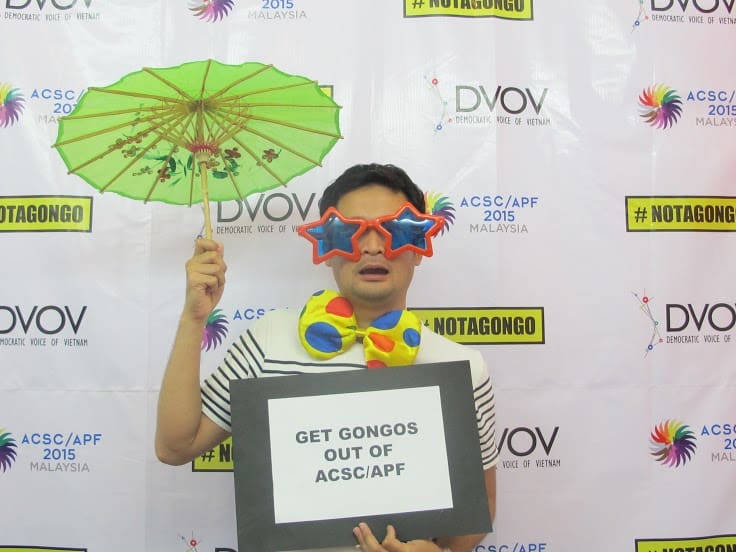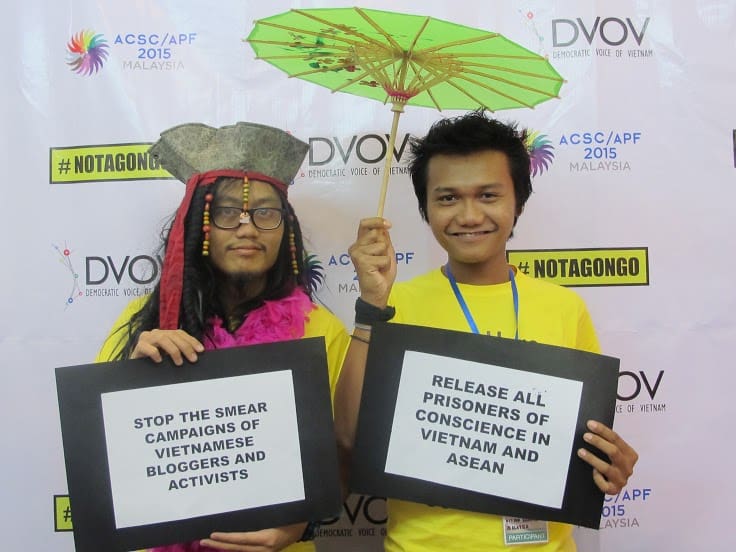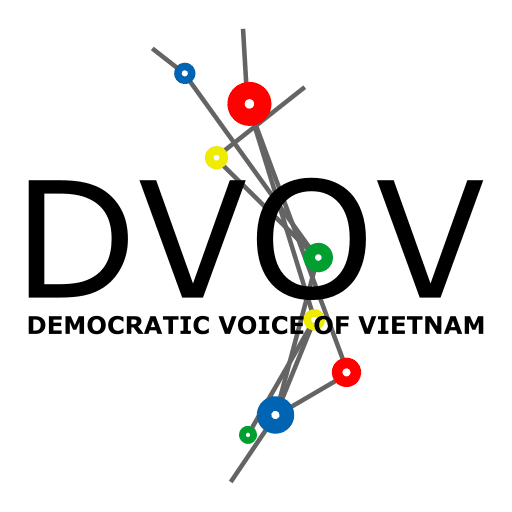
What is #NOTAGONGO?
The #NOTAGONGO campaign was born at the ASEAN Civil Society Conference / ASEAN People’s Forum (ACSC/APF) held in Kuala Lumpur, Malaysia in April 2015. While the hashtag campaign arose out of the serious GONGO problem inside Vietnam, it aims at building a wider movement with other independent CSOs and human rights based organizations across ASEAN and the wider international community. The hashtag focuses on GONGOs as a systemic problem in several countries in the region. In doing so, it does not aim to demonize any individuals, but to playfully raise awareness on an important regional issue that needs our attention.

What is a GONGO?
GONGO stands for Government Organized Non-Governmental Organization. Strange, right? We think so too! Since GONGOs are not only typically set up and established by the government but are subsequently tightly monitored by the state, or in many instances, under direct government supervision and control, the “NGO” part of the name doesn’t make a whole lot of sense. At a most fundamental level, if we are to use the common understanding of civil society as a “3rd sector”—neither private sector or public sector (government)—then GONGOs very obviously overstep and blur this clearly delineated line, which, in our view, disqualifies them as “civil society” organizations. But the problems go beyond mere semantics or mischaracterization.
Why are GONGOs so problematic?
GONGOs have several characteristics that in many ways are harmful towards the development of a thriving civil society. Here is a non-exhaustive list:
- GONGOs present a dangerous illusion: GONGOs often give the illusion of an open and robust civil society. This is in many ways part of their purpose. Under tight control and clear directives, GONGOs, utilizing their superior access to funds and resources, join regional and international forums, workshops, and consultations. In doing so, they stay on script and help to produce a masterful public relations façade (as long as no one ask them too many probing questions about human rights or other controversial matters).
- GONGOs act as gatekeepers: As GONGOs enter into the civil society arena, they tend to co-opt and monopolize these spaces. Their participation in civil society shrinks space available to independent and genuine groups. Exclusion of these other groups is not a coincidence, but carefully calculated and deliberate.
- GONGOs consume resources: In presenting themselves as civil society organizations or non-government entities and operating in generally favorable environments, GONGOs are able to gather disproportionate funds relative to their non-GONGO counterparts.
- GONGOs dilute the conversation: As GONGOs go about their work the consequences to discussions, processes and outcomes are actually quite serious. Bound by their master, GONGOs are not able to talk about critical issues that civil society needs to discuss. They even go so far as to present distorted or false information or to block vital conversations entirely. This manifests in regional forums, workshops, and even in civil society shadow reports to UN Treaty Bodies. Unfortunately, it is precisely the most crucial issues that need to be discussed which get mischaracterized or brushed aside because of GONGOs. Importantly, this pollution of civil society, like other forms on pollution, lacks neat and tidy borders. It drifts well beyond being the problem of a particular country, as civil society at the regional level is held hostage.

What happens when GONGOs rule civil society spaces?
In short, as GONGOs rule the landscape, genuine civil society will remain underdeveloped and isolated and critical issues are left off the table. Civil society will be unable to properly function and fulfill its purpose.
What are some examples of GONGO problems in ASEAN?
- For the ACSC/APF conference held in 17-19 November 2015 in Malaysia, ongoing undemocratic national processes have resulted in the exclusion of independent groups from several countries, including Vietnam, Laos, and Brunei. Limited scholarship distribution through this process has meant GONGOs are being fully funded to attend the conference while others have no chance of joining.
- The ACSC/APF 2016 was supposed to be held in Laos, but Laos has declined to host. While Laos has placed blame elsewhere, cancellation relates directly to government and GONGO control of the process.
- Leading up to the ACSC/APF 2015 conference interface with government, Singapore and Cambodia withdrew. Independent Vietnamese groups also contested an undemocratic selection process and the appointment of GONGOs by Vietnam and Laos.
- During the ACSC/APF 2015 and its consultation process, GONGOs from Vietnam tried to remove references to democracy and persecution of ethnic minorities from the joint statement and tried vehemently to keep independent groups out of their process. Laos GONGOs tried to remove references to Sombath Somphone, failed to answer questions on their national process, and took many worrisome stances in opposition to basic civil society principles.
- When ACSC/APF was held in Cambodia, the conference split into two distinct events: a GONGO conference and a genuine CSO conference.
- In 2010 when the APF was held in Hanoi many delegates from other countries who were known as human rights defenders were not permitted to enter the country in order to attend the conference, and there were extreme limitations on free speech at the conference itself.
How can I detect a GONGO? OUR MINI “GONGO DETECTOR”
The nice thing about GONGOs is that they tend to reveal who they really are quite easily since their directives are often diametrically opposed to the typical stances and human rights based focus that inform genuine civil society. Try some of these questions from our “GONGO Detector” to uncover if you may be dealing with a GONGO:
THE GONGO DETECTOR
- Does the organization or its members speak or act in any way which violates the ACSC/APF’s Guiding Principles and Engagement Modality?
- Does the organization or its members tend to prioritize ideas of national security, peace, and harmony over human rights concerns?
- Does the organization or its members promote respect for “the ASEAN way”, the Bangkok Declaration, or non-interference in conversations about human rights violation?
- Does the organization or its members discourage naming and shaming of governments?
- Does the organization or its members cite and reference deadlines and other technicalities usually in an effort to be non-inclusive or to disqualify someone or a progressive idea?
- Does the organization or its members actively defend its government in conversations, or at least aim to silence criticism of its government?
- Does the organization or its members actively compliment and thank the government with high frequency?
- Does the organization or its members appear to focus only or mainly on politically “neutral” topics?
- Does the organization or its members appear to be using civic spaces as a platform for pushing forward state agendas or an agenda that aligns closely with their government?
- Does the resume of the organization’s members include previous experience in government positions?
SCORING RUBRIC
1-3 = A Mild GONGO: If you got 1-3 YES answers, it is possible you are dealing with a “mild GONGO” or “Quasi-GONGO”. This may be an individual or organization with some good intentions but stuck inside a GONGO structure where measured stances are required.
4-5 = Probable GONGO: As these questions utilize commonly shared views held by civil society and grounded in human rights principles, 3-6 YES answers with our detector suggests that you are most likely dealing with a GONGO or Quasi GONGO.
6-10 = Hardline GONGO / Gatekeeper GONGO: If you get a majority of YES answers to these questions, you are almost undoubtedly dealing with a GONGO on a mission to monopolize civil society space and to push forward an ASEAN government’s agenda.
What can I do to solve the GONGO problem?
While there is no easy solution for solving this deeply entrenched problem, complacency and avoiding dealing with the GONGO problem is the biggest obstacle in moving forward. The #NOTAGONGO campaign and DVOV hopes to jump-start this important conversation. We hope that you will join the movement!
Where can I go to learn more about GONGOs?
DVOV has several pages with English language resources on the GONGO problem for Vietnam. We suggest you start with our ACSC/APF Action Hub, where you can see many videos and statements from Vietnam’s independent CSOs. You can connect with Vietnam’s independent CSOs through our directory (keep in mind, not all the groups have English speakers). Our page on English resources on free association in Vietnam is a space where you can access academic and legal analysis on Vietnam’s legal system, free association, and how civil society is tightly regulated.

Hurrah! At last I got a web site from where I know how to truly take valuable information concerning my…